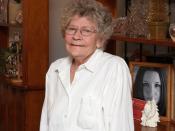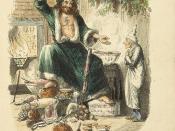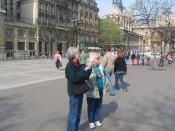Charles John Huffam Dickens was born February 7, 1812, in Portsmouth, New Hampshire, but left it in infancy. His happiest childhood years were spent in Chatham, an area to which he often talks about in his stories. From 1822 he lived in London, until, in 1860, he moved permanently to a country house, Gad's Hill, near Chatham. His family was middle class, very respectable; one randfather had been a domestic servant, and the other an embezzler. His father was a clerk in the navy pay office and was well paid, but he often brought the family to financial embarrassment or disaster. Some of his failings and his enthusiasm are dramatized in Mr. Micawber in the partly autobiographical "David Copperfield." In 1824 the family reached bottom. Charles, the oldest son, had been taken out of school and was now set to work manually in a factory. His father went to prison for debt.
These shocks deeply affected Charles. Though terrible, this brief collapse into the working class, he began to gain that sympathetic knowledge of their life that informed his writings. Also, the images of the prison and of the lost, oppressed, or bewildered child recur in many novels. When his father and mother got out of jail his mother wanted him to stay at work. Happily the father's view prevailed. His schooling, interrupted and unimpressive, ended at 15. He became a clerk in a solicitor's office, then a shorthand reporter in the lawcourts, and finally, like other members of his family, a parliamentary and newspaper reporter. These years left him with a lasting affection for journalism and contempt both for the law and for Parliament. His coming to manhood in the reformist 1830s, and particularly his working on the Liberal Benthamite "Morning Chronicle" greatly affected his political outlook. Another influential event now was his rejection as suitor to Maria Beadnell because his family and prospects were unsatisfactory. His hopes of gaining and shock at losing her sharpened his determination to succeed. His feelings about Maria then and at her later brief and disillusioning reentry into his life are reflected in David Copperfield's adoration of Dora Spenlow and in the middle-aged Arthur Clennam's discovery that Flora Finching, who had seemed enchanting years ago, was "diffuse and silly," that Flora "whom he had left a lily, had become a servant." A Christmas Carol, suddenly conceived and written in a few weeks, was the first of these Christmas books. Tossed off while he was engaged in writing Chuzzlewit, it was an extraordinary achievement--the one great Christmas myth of modern literature. His view of life was later to be described or dismissed as "Christmas philosophy and he himself spoke of "Carol philosophy" as the basis of a projected work. His "philosophy," never very elaborated, involved more than wanting the Christmas spirit to prevail throughout the year, but his great attachment to Christmas is indeed significant and has contributed to his popularity. "Dickens dead?" exclaimed a London costermonger's girl in 1870. "Then will Father Christmas die too?"--A tribute both to his association with Christmas and to the mythological status of the man as well as of his work. The Carol immediately entered the general consciousness; Thackeray, in a review, called it "a national benefit, and to every man and woman who reads it a personal kindness." Further Christmas books, essays, and stories followed annually through 1867. None equaled the Carol in potency, though some achieved great immediate popularity. They represent a celebration of Christmas attempted by no other great author.





